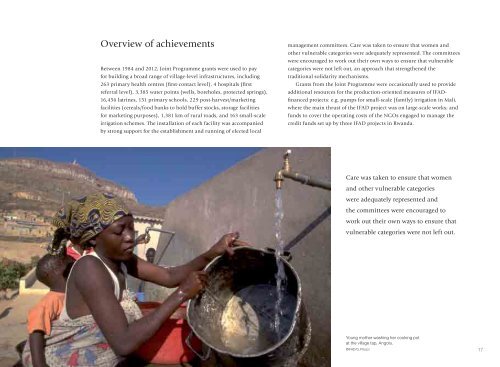You also want an ePaper? Increase the reach of your titles
YUMPU automatically turns print PDFs into web optimized ePapers that Google loves.
Overview of achievements<br />
Between 1984 and 2012, Joint Programme grants were used to pay<br />
<strong>for</strong> building a broad range of village-level infrastructures, including<br />
263 primary health centres (first-contact level), 4 hospitals (first<br />
referral level), 3,385 water points (wells, boreholes, protected springs),<br />
16,456 latrines, 151 primary schools, 229 post-harvest/marketing<br />
facilities (cereals/food banks to hold buffer stocks, storage facilities<br />
<strong>for</strong> marketing purposes), 1,381 km of rural roads, and 163 small-scale<br />
irrigation schemes. The installation of each facility was accompanied<br />
by strong support <strong>for</strong> the establishment and running of elected local<br />
management committees. Care was taken to ensure that women and<br />
other vulnerable categories were adequately represented. The committees<br />
were encouraged to work out their own ways to ensure that vulnerable<br />
categories were not left out, an approach that strengthened the<br />
traditional solidarity mechanisms.<br />
Grants from the Joint Programme were occasionally used to provide<br />
additional resources <strong>for</strong> the production-oriented measures of <strong>IFAD</strong>financed<br />
projects: e.g. pumps <strong>for</strong> small-scale (family) irrigation in Mali,<br />
where the main thrust of the <strong>IFAD</strong> project was on large-scale works; and<br />
funds to cover the operating costs of the NGOs engaged to manage the<br />
credit funds set up by three <strong>IFAD</strong> projects in Rwanda.<br />
Care was taken to ensure that women<br />
and other vulnerable categories<br />
were adequately represented and<br />
the committees were encouraged to<br />
work out their own ways to ensure that<br />
vulnerable categories were not left out.<br />
Young mother washing her cooking pot<br />
at the village tap, Angola.<br />
©<strong>IFAD</strong>/G. Pirozzi<br />
17

















